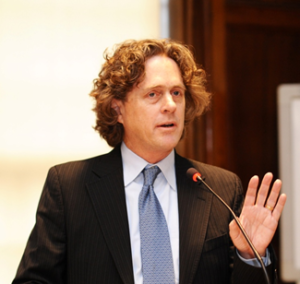FEATURE ARTICLES
Excellent article, an overview of neoliberalism–what it is and the issues it creates–written by George Manbiot and published by several outlets (here from The Guardian).
Outstanding article on neoliberalism and higher education, from Harper’s, written by William Deresiewicz on what he calls “the neoliberal arts,”
See Chris Lorenz’s nodal article on neoliberalism in public higher education as expressed as “New Public Management‘.
BOOKS (descriptions courtesy of Goodreads)
Neoliberalism and Academic Repression
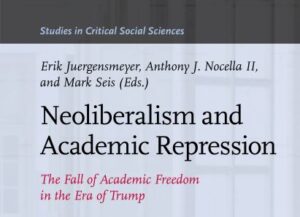 Neoliberalism and Academic Repression: The Fall of Academic Freedom in the Era of Trump, co-edited by Erik Juergensmeyer, Anthony J. Nocella II, and Mark Seis, provides a theoretical examination of the current higher education system and explains how academia is being shaped into a corporate-factory-industrial-complex. This complex is transforming the relationships within and beyond the institution, transforming the mission of higher education from being the foundation of democracy to a manager of professionalism.
Neoliberalism and Academic Repression: The Fall of Academic Freedom in the Era of Trump, co-edited by Erik Juergensmeyer, Anthony J. Nocella II, and Mark Seis, provides a theoretical examination of the current higher education system and explains how academia is being shaped into a corporate-factory-industrial-complex. This complex is transforming the relationships within and beyond the institution, transforming the mission of higher education from being the foundation of democracy to a manager of professionalism.
The outstanding contributors offer strategies of social change, policy suggestions, and important critiques of neoliberal practices. This timely collection challenges the neoliberal emphasis on valuation based on job readiness and outcome achievement—promoting equity, justice, and inclusivity in the process.
Contributors include Camila Bassi, Brad Benz, A. Peter Castro, Taine Duncan, Sarah Giragosian, Erik Juergensmeyer, Caroline K. Kaltefleiter, Peter N. Kirstein, Emil Marmol, Anthony J. Nocella II, Ben Ristow, JL Schatz, Mark Seis, Jeff Shantz, Kim Socha, Richard J. White.
Creating the Market University
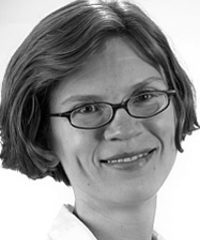 American universities today serve as economic engines, performing the scientific research that will create new industries, drive economic growth, and keep the United States globally competitive. But only a few decades ago, these same universities self-consciously held themselves apart from the world of commerce. Creating the Market University is the first book to systematically examine why academic science made such a dramatic move toward the market. Drawing on extensive historical research, Elizabeth Popp Berman shows how the government–influenced by the argument that innovation drives the economy–brought about this transformation.
American universities today serve as economic engines, performing the scientific research that will create new industries, drive economic growth, and keep the United States globally competitive. But only a few decades ago, these same universities self-consciously held themselves apart from the world of commerce. Creating the Market University is the first book to systematically examine why academic science made such a dramatic move toward the market. Drawing on extensive historical research, Elizabeth Popp Berman shows how the government–influenced by the argument that innovation drives the economy–brought about this transformation.
Americans have a long tradition of making heroes out of their inventors. But before the 1960s and ’70s neither policymakers nor economists paid much attention to the critical economic role played by innovation. However, during the late 1970s, a confluence of events–industry concern with the perceived deterioration of innovation in the United States, a growing body of economic research on innovation’s importance, and the stagnation of the larger economy–led to a broad political interest in fostering invention. The policy decisions shaped by this change were diverse, influencing arenas from patents and taxes to pensions and science policy, and encouraged practices that would focus specifically on the economic value of academic science. By the early 1980s, universities were nurturing the rapid growth of areas such as biotech entrepreneurship, patenting, and university-industry research centers.
Contributing to debates about the relationship between universities, government, and industry, Creating the Market University sheds light on how knowledge and politics intersect to structure the economy.
In the Ruins of Neoliberalism: The Rise of Antidemocratic Politics in the West
 (From Goodreads) Across the West, hard-right leaders are surging to power on platforms of ethno-economic nationalism, Christianity, and traditional family values. Is this phenomenon the end of neoliberalism or its monstrous offspring?
(From Goodreads) Across the West, hard-right leaders are surging to power on platforms of ethno-economic nationalism, Christianity, and traditional family values. Is this phenomenon the end of neoliberalism or its monstrous offspring?
In the Ruins of Neoliberalism casts the hard-right turn as animated by socioeconomically aggrieved white working- and middle-class populations but contoured by neoliberalism’s multipronged assault on democratic values. From its inception, neoliberalism flirted with authoritarian liberalism as it warred against robust democracy. It repelled social-justice claims through appeals to market freedom and morality. It sought to de-democratize the state, economy, and society and re-secure the patriarchal family. In key works of the founding neoliberal intellectuals, Wendy Brown traces the ambition to replace democratic orders with ones disciplined by markets and traditional morality and democratic states with technocratic ones.
Yet plutocracy, white supremacy, politicized mass affect, indifference to truth, and extreme social disinhibition were no part of the neoliberal vision. Brown theorizes their unintentional spurring by neoliberal reason, from its attack on the value of society and its fetish of individual freedom to its legitimation of inequality. Above all, she argues, neoliberalism’s intensification of nihilism coupled with its accidental wounding of white male supremacy generates an apocalyptic populism willing to destroy the world rather than endure a future in which this supremacy disappears.
The Toxic University
by John Smyth
 This book considers the detrimental changes that have occurred to the institution of the university, as a result of the withdrawal of state funding and the imposition of neoliberal market reforms on higher education. It argues that universities have lost their way, and are currently drowning in an impenetrable mush of economic babble, spurious spin-offs of zombie economics, management-speak and militaristic-corporate jargon. John Smyth provides a trenchant and excoriating analysis of how universities have enveloped themselves in synthetic and meaningless marketing hype, and explains what this has done to academic work and the culture of universities – specifically, how it has degraded higher education and exacerbated social inequalities among both staff and students. Finally, the book explores how we might commence a reclamation. It should be essential reading for students and researchers in the fields of education and sociology, and anyone interested in the current state of university management. (Description from Goodreads)
This book considers the detrimental changes that have occurred to the institution of the university, as a result of the withdrawal of state funding and the imposition of neoliberal market reforms on higher education. It argues that universities have lost their way, and are currently drowning in an impenetrable mush of economic babble, spurious spin-offs of zombie economics, management-speak and militaristic-corporate jargon. John Smyth provides a trenchant and excoriating analysis of how universities have enveloped themselves in synthetic and meaningless marketing hype, and explains what this has done to academic work and the culture of universities – specifically, how it has degraded higher education and exacerbated social inequalities among both staff and students. Finally, the book explores how we might commence a reclamation. It should be essential reading for students and researchers in the fields of education and sociology, and anyone interested in the current state of university management. (Description from Goodreads)
Two Cheers for Higher Education
by Steven Brint
 (from Goodreads) Crushing student debt, rapidly eroding state funding, faculty embroiled in speech controversies, a higher-education market disrupted by online competition–today’s headlines suggest that universities’ power to advance knowledge and shape American society is rapidly declining. But Steven Brint, a renowned analyst of academic institutions, has tracked numerous trends demonstrating their vitality. After a recent period that witnessed soaring student enrollment and ample research funding, universities, he argues, are in a better position than ever before.
(from Goodreads) Crushing student debt, rapidly eroding state funding, faculty embroiled in speech controversies, a higher-education market disrupted by online competition–today’s headlines suggest that universities’ power to advance knowledge and shape American society is rapidly declining. But Steven Brint, a renowned analyst of academic institutions, has tracked numerous trends demonstrating their vitality. After a recent period that witnessed soaring student enrollment and ample research funding, universities, he argues, are in a better position than ever before.
Focusing on the years 1980-2015, Brint details the trajectory of American universities, which was influenced by evolving standards of disciplinary professionalism, market-driven partnerships (especially with scientific and technological innovators outside the academy), and the goal of social inclusion. Conflicts arose: academic entrepreneurs, for example, flouted their campus responsibilities, and departments faced backlash over the hiring of scholars with nontraditional research agendas. Nevertheless, educators’ commitments to technological innovation and social diversity prevailed and created a new dynamism.
Brint documents these successes along with the challenges that result from rapid change. Today, knowledge-driven industries generate almost half of U.S. GDP, but divisions by educational level split the American political order. Students flock increasingly to fields connected to the power centers of American life and steer away from the liberal arts. And opportunities for economic mobility are expanding even as academic expectations decline.
In describing how universities can meet such challenges head on, especially in improving classroom learning, Brint offers not only a clear-eyed perspective on the current state of American higher education but also a pragmatically optimistic vision for the future.
Land-Grant Universities for the Future: Higher Education for the Public Good
By Stephen M. Gavazzi, and E Gordon Gee
 Land-grant colleges and universities occupy a special place in the landscape of American higher education. Publicly funded agricultural and technical educational institutions were first founded in the mid-nineteenth century with the Morrill Act, which established land grants to support these schools. They include such prominent names as Cornell, Maryland, Michigan State, MIT, Ohio State, Penn State, Rutgers, Texas A&M, West Virginia University, Wisconsin, and the University of California–in other words, four dozen of the largest and best public universities in America. Add to this a number of historically black colleges and universities (HBCUs) and tribal colleges–in all, almost 300 institutions. Their mission is a democratic and pragmatic one: to bring science, technology, agriculture, and the arts to the American people.
Land-grant colleges and universities occupy a special place in the landscape of American higher education. Publicly funded agricultural and technical educational institutions were first founded in the mid-nineteenth century with the Morrill Act, which established land grants to support these schools. They include such prominent names as Cornell, Maryland, Michigan State, MIT, Ohio State, Penn State, Rutgers, Texas A&M, West Virginia University, Wisconsin, and the University of California–in other words, four dozen of the largest and best public universities in America. Add to this a number of historically black colleges and universities (HBCUs) and tribal colleges–in all, almost 300 institutions. Their mission is a democratic and pragmatic one: to bring science, technology, agriculture, and the arts to the American people.
In this book, Stephen M. Gavazzi and E. Gordon Gee discuss present challenges to and future opportunities for these institutions. Drawing on interviews with 27 college presidents and chancellors, Gavazzi and Gee explore the strengths and weaknesses of land-grant universities while examining the changing threats they face. Arguing that the land-grant university of the twenty-first century is responsible for a wide range of constituencies, the authors also pay specific attention to the ways these universities meet the needs of the communities they serve. Ultimately, the book suggests that leaders and supporters should become more fiercely land-grant in their orientation; that is, they should work to more vigorously uphold their community-focused missions through teaching, research, and service-oriented activities.
OUR HIGHER CALLING: REBUILDING THE PARTNERSHIP BETWEEN AMERICA AND ITS COLLEGES AND UNIVERSITIES
By Holden Thorp and Buck Goldstein
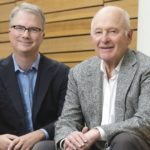 There is a growing sense of crisis and confusion about the purpose and sustainability of higher education in the United States. In the midst of this turmoil, students are frequently referred to as customers and faculty as employees, educational outcomes are increasingly measured in terms of hiring and salary metrics for graduates, and programs are assessed as profit and loss centers. Despite efforts to integrate business-oriented thinking and implement new forms of accountability in colleges and universities, Americans from all backgrounds are losing confidence in the nation’s institutions of higher learning, and these institutions must increasingly confront what has proven to be an unsustainable business model.
There is a growing sense of crisis and confusion about the purpose and sustainability of higher education in the United States. In the midst of this turmoil, students are frequently referred to as customers and faculty as employees, educational outcomes are increasingly measured in terms of hiring and salary metrics for graduates, and programs are assessed as profit and loss centers. Despite efforts to integrate business-oriented thinking and implement new forms of accountability in colleges and universities, Americans from all backgrounds are losing confidence in the nation’s institutions of higher learning, and these institutions must increasingly confront what has proven to be an unsustainable business model.
In Our Higher Calling, Holden Thorp and Buck Goldstein draw on interviews with higher education thought leaders and their own experience, inside and outside the academy, to address these problems head-on, articulating the challenges facing higher education and describing in pragmatic terms what can and cannot change–and what should and should not change. They argue that those with a stake in higher education must first understand a fundamental compact that has long been at the heart of the American system: a partnership wherein colleges and universities support the development of an educated and skilled citizenry and create new knowledge in exchange for stable public investment and a strong degree of autonomy to pursue research without undue external pressure. By outlining ways to restore this partnership, Thorp and Goldstein endeavor to start a conversation that paves the way for a solution to one of the country’s most pressing problems.
Knowledge for Sale: The Neoliberal Takeover of Higher Education
 A new philosophy of higher education has taken hold in institutions around the world. Its supporters disavow the pursuit of knowledge for its own sake and argue that the only knowledge worth pursuing is that with more or less immediate market value. Every other kind of learning is downgraded and its budget cut.
A new philosophy of higher education has taken hold in institutions around the world. Its supporters disavow the pursuit of knowledge for its own sake and argue that the only knowledge worth pursuing is that with more or less immediate market value. Every other kind of learning is downgraded and its budget cut.
In Knowledge for Sale, Lawrence Busch challenges this market-driven approach. The rationale for the current thinking, Busch explains, comes from neoliberal economics, which calls for reorganizing society around the needs of the market. The market-influenced changes to higher education include shifting the cost of education from the state to the individual; turning education from a public good to a private good subject to consumer demand; redefining higher education as a search for the highest-paying job; and turning scholarly research into a competition based on metrics including number of citations and value of grants. Students, administrators, and scholars have begun to think of themselves as economic actors rather than seekers of knowledge.
Arguing for active resistance to this takeover, Busch urges us to burst the neoliberal bubble, to imagine a future not dictated by the market, a future in which there is a more educated citizenry and in which the old dichotomies—market and state, nature and culture, and equality and liberty—break down. In this future, universities value learning and not training, scholarship grapples with society’s most pressing problems rather than quick fixes for corporate interests, and democracy is enriched by its educated and engaged citizens.
Galileo’s Middle Finger: Heretics, Activists, and the Search for Justice in Science
by ALICE DREGER
 An impassioned defense of intellectual freedom and a clarion call to intellectual responsibility, Galileo’s Middle Finger is one American’s eye-opening story of life in the trenches of scientific controversy. For two decades, historian Alice Dreger has led a life of extraordinary engagement, combining activist service to victims of unethical medical research with the defense of scientists whose work has outraged identity politics activists. With spirit and wit, Dreger offers in Galileo’s Middle Finger an unforgettable vision of the importance of rigorous truth-seeking in today’s America, where both the free press and free scholarly inquiry struggle under dire economic and political threats.
An impassioned defense of intellectual freedom and a clarion call to intellectual responsibility, Galileo’s Middle Finger is one American’s eye-opening story of life in the trenches of scientific controversy. For two decades, historian Alice Dreger has led a life of extraordinary engagement, combining activist service to victims of unethical medical research with the defense of scientists whose work has outraged identity politics activists. With spirit and wit, Dreger offers in Galileo’s Middle Finger an unforgettable vision of the importance of rigorous truth-seeking in today’s America, where both the free press and free scholarly inquiry struggle under dire economic and political threats.
 Neoliberal rationality—ubiquitous today in statecraft and the workplace, in jurisprudence, education, and culture—remakes everything and everyone in the image of homo oeconomicus. What happens when this rationality transposes the constituent elements of democracy into an economic register? In Undoing the Demos, Wendy Brown explains how democracy itself is imperiled. The demos disintegrates into bits of human capital; concerns with justice bow to the mandates of growth rates, credit ratings, and investment climates; liberty submits to the imperative of human capital appreciation; equality dissolves into market competition, and popular sovereignty grows incoherent. Liberal democratic practices may not survive these transformations. Radical democratic dreams may not either.
Neoliberal rationality—ubiquitous today in statecraft and the workplace, in jurisprudence, education, and culture—remakes everything and everyone in the image of homo oeconomicus. What happens when this rationality transposes the constituent elements of democracy into an economic register? In Undoing the Demos, Wendy Brown explains how democracy itself is imperiled. The demos disintegrates into bits of human capital; concerns with justice bow to the mandates of growth rates, credit ratings, and investment climates; liberty submits to the imperative of human capital appreciation; equality dissolves into market competition, and popular sovereignty grows incoherent. Liberal democratic practices may not survive these transformations. Radical democratic dreams may not either.
In an original and compelling argument, Brown explains how and why neoliberal reason undoes the political form and political imaginary it falsely promises to secure and reinvigorate. Through meticulous analyses of neoliberalized law, political practices, governance, and education, she charts the new common sense. Undoing the Demos makes clear that for democracy to have a future, it must become an object of struggle and rethinking.
Higher education in America, still thought to be the world leader, is in crisis. University students are falling behind their international peers in attainment while suffering from unprecedented student debt. For over a decade, the realm of American higher education has been wracked with self-doubt and mutual recrimination, with no clear solutions on the horizon. How did this happen? In this stunning new book, Christopher Newfield offers readers an in-depth analysis of the “great mistake” that led to the cycle of decline and dissolution, a mistake that impacts every public college and university in America. What might occur, he asserts, is no less than locked-in economic inequality and the fall of the middle class.
In The Great Mistake, Newfield asks how we can fix higher education, given the damage done by private-sector models. The currently accepted wisdom—that to succeed, universities should be more like businesses—is dead wrong. Newfield combines firsthand experience with expert analysis to show that private funding and private-sector methods cannot replace public funding or improve efficiency, arguing that business-minded practices have increased costs and gravely damaged the university’s value to society.
It is imperative that universities move beyond the destructive policies that have led them to destabilize their finances, raise tuition, overbuild facilities, create a national student debt crisis, and lower educational quality. Laying out an interconnected cycle of mistakes, from subsidizing the private sector to “the poor get poorer” funding policies, Newfield clearly demonstrates how decisions made in government, in the corporate world, and at colleges themselves contribute to the dismantling of once-great public higher education. A powerful, hopeful critique of the unnecessary death spiral of higher education, The Great Mistake is essential reading for those who wonder why students have been paying more to get less and for everyone who cares about the role the higher education system plays in improving the lives of average Americans.
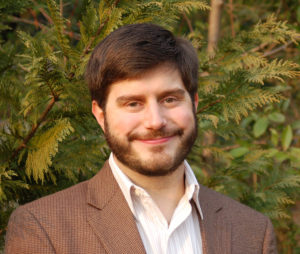 Today, nearly every aspect of higher education—including student recruitment, classroom instruction, faculty research, administrative governance, and the control of intellectual property—is embedded in a political economy with links to the market and the state. Academic capitalism offers a powerful framework for understanding this relationship. Essentially, it allows us to understand higher education’s shift from creating scholarship and learning as a public good to generating knowledge as a commodity to be monetized in market activities.
Today, nearly every aspect of higher education—including student recruitment, classroom instruction, faculty research, administrative governance, and the control of intellectual property—is embedded in a political economy with links to the market and the state. Academic capitalism offers a powerful framework for understanding this relationship. Essentially, it allows us to understand higher education’s shift from creating scholarship and learning as a public good to generating knowledge as a commodity to be monetized in market activities.
In Academic Capitalism in the Age of Globalization, Brendan Cantwell and Ilkka Kauppinen assemble an international team of leading scholars to explore the profound ways in which globalization and the knowledge economy have transformed higher education around the world. The book offers an in-depth assessment of the theoretical foundations of academic capitalism, as well as new empirical insights into how the process of academic capitalism has played out. Chapters address academic capitalism from historical, transnational, national, and local perspectives. Each contributor offers fascinating insights into both new conceptual interpretations of and practical institutional and national responses to academic capitalism.
Incorporating years of research by influential theorists and building on the work of Sheila Slaughter, Larry Leslie, and Gary Rhoades, Academic Capitalism in the Age of Globalization provides a provocative update for understanding academic capitalism. The book will appeal to anyone trying to make sense of contemporary higher education.
A Penny For Your Thoughts: How Corporatization Devalues Teaching, Research, and Public service in Canada’s Universities
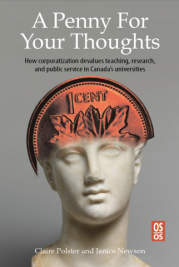 Simmering conflicts in higher education have reached the boiling point across Canada and around the globe. Teach-ins, occupations, strikes, and mass protests are being mobilized against exorbitant tuition fees, declining educational quality, mismanagement, the commodification of research, and the suppression of free speech and critical inquiry. A Penny For Your Thoughts shows how Canadian higher education has come to this point.
Simmering conflicts in higher education have reached the boiling point across Canada and around the globe. Teach-ins, occupations, strikes, and mass protests are being mobilized against exorbitant tuition fees, declining educational quality, mismanagement, the commodification of research, and the suppression of free speech and critical inquiry. A Penny For Your Thoughts shows how Canadian higher education has come to this point.
 As colleges and universities become more entrepreneurial in a post-industrial economy, they focus on knowledge less as a public good than as a commodity to be capitalized on in profit-oriented activities. InAcademic Capitalism and the New Economy, higher education scholars Sheila Slaughter and Gary Rhoades detail the aggressive engagement of U.S. higher education institutions in the knowledge-based economy and analyze the efforts of colleges and universities to develop, market, and sell research products, educational services, and consumer goods in the private marketplace.
As colleges and universities become more entrepreneurial in a post-industrial economy, they focus on knowledge less as a public good than as a commodity to be capitalized on in profit-oriented activities. InAcademic Capitalism and the New Economy, higher education scholars Sheila Slaughter and Gary Rhoades detail the aggressive engagement of U.S. higher education institutions in the knowledge-based economy and analyze the efforts of colleges and universities to develop, market, and sell research products, educational services, and consumer goods in the private marketplace.
Slaughter and Rhoades track changes in policy and practice, revealing new social networks and circuits of knowledge creation and dissemination, as well as new organizational structures and expanded managerial capacity to link higher education institutions and markets. They depict an ascendant academic capitalist knowledge/learning regime expressed in faculty work, departmental activity, and administrative behavior. Clarifying the regime’s internal contradictions, they note the public subsidies embedded in new revenue streams and the shift in emphasis from serving student customers to leveraging resources from them.
Defining the terms of academic capitalism in the new economy, this groundbreaking study offers essential insights into the trajectory of American higher education.
